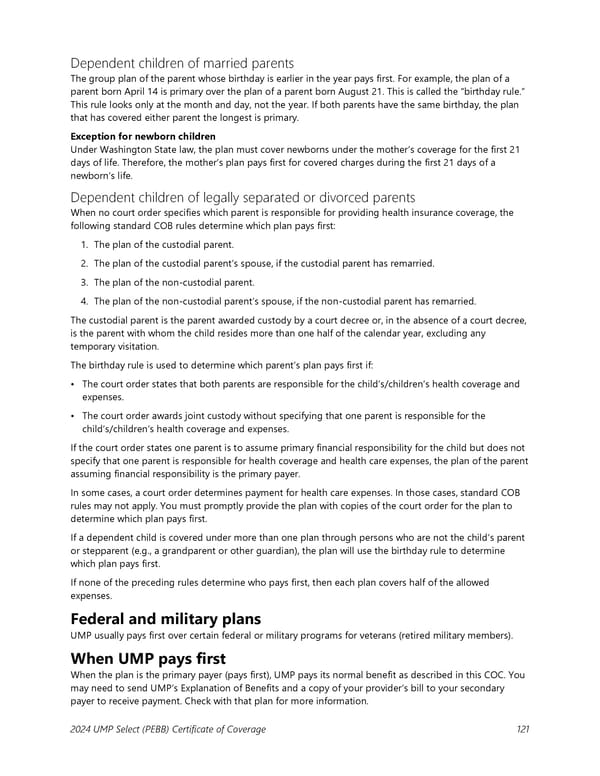Dependent children of married parents The group plan of the parent whose birthday is earlier in the year pays first. For example, the plan of a parent born April 14 is primary over the plan of a parent born August 21. This is called the “birthday rule.” This rule looks only at the month and day, not the year. If both parents have the same birthday, the plan that has covered either parent the longest is primary. Exception for newborn children Under Washington State law, the plan must cover newborns under the mother’s coverage for the first 21 days of life. Therefore, the mother’s plan pays first for covered charges during the first 21 days of a newborn’s life. Dependent children of legally separated or divorced parents When no court order specifies which parent is responsible for providing health insurance coverage, the following standard COB rules determine which plan pays first: 1. The plan of the custodial parent. 2. The plan of the custodial parent’s spouse, if the custodial parent has remarried. 3. The plan of the non-custodial parent. 4. The plan of the non-custodial parent’s spouse, if the non-custodial parent has remarried. The custodial parent is the parent awarded custody by a court decree or, in the absence of a court decree, is the parent with whom the child resides more than one half of the calendar year, excluding any temporary visitation. The birthday rule is used to determine which parent’s plan pays first if: • The court order states that both parents are responsible for the child’s/children’s health coverage and expenses. • The court order awards joint custody without specifying that one parent is responsible for the child’s/children’s health coverage and expenses. If the court order states one parent is to assume primary financial responsibility for the child but does not specify that one parent is responsible for health coverage and health care expenses, the plan of the parent assuming financial responsibility is the primary payer. In some cases, a court order determines payment for health care expenses. In those cases, standard COB rules may not apply. You must promptly provide the plan with copies of the court order for the plan to determine which plan pays first. If a dependent child is covered under more than one plan through persons who are not the child’s parent or stepparent (e.g., a grandparent or other guardian), the plan will use the birthday rule to determine which plan pays first. If none of the preceding rules determine who pays first, then each plan covers half of the allowed expenses. Federal and military plans UMP usually pays first over certain federal or military programs for veterans (retired military members). When UMP pays first When the plan is the primary payer (pays first), UMP pays its normal benefit as described in this COC. You may need to send UMP’s Explanation of Benefits and a copy of your provider’s bill to your secondary payer to receive payment. Check with that plan for more information. 2024 UMP Select (PEBB) Certificate of Coverage 121
 UMP Select COC (2024) Page 121 Page 123
UMP Select COC (2024) Page 121 Page 123